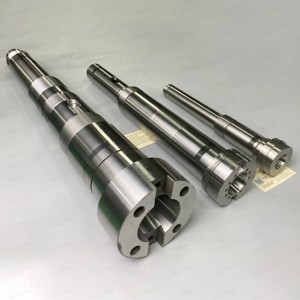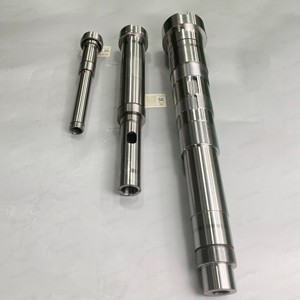(1190 products available)
































































































































































































































CNC machining refers to computer numerical control, a mechanism used in driving various tools and machines. Machining splines are precision shafts with ridges or teeth. They work in interlocking and transmitting torque between two connected components. There are different types of CNC machine spline shafts that businesses should be aware of.
Precision CNC machining of spline shafts finds extensive usage scenarios across various industries. Here are some industry applications of spline shafts:
Automotive Industry:
Spline shafts transmit torque and power between components in vehicles, such as the axle, driveshaft, steering column, and transmission system. CNC machining ensures precise fit and alignment. This supports effective power transmission and component connection in automotive applications.
Machinery and Equipment:
Precision CNC machining spline shafts are extensively used in mechanical equipment. They serve as key coupling elements. They connect rotating parts like motors, gearboxes, and generators. Spline shafts facilitate torque transmission. They enable coordination among different mechanical devices. CNC machining guarantees dimensional accuracy and quality. This meets the high demands for functioning and reliability in mechanical devices.
Aerospace Industry:
In the aerospace sector, precision is paramount. Spline shafts are crucial in aircraft and spacecraft for connecting and transmitting torque between components such as control surfaces, landing gear, and engines. CNC machining ensures proper engagement and smooth operation of moving parts, critical for the safety and performance of aerospace vehicles.
Medical Technology:
Precision CNC machining spline shafts play an important role in medical devices. They are used in equipment like infusion pumps, MRI machines, and robotic surgery systems. Spline shafts provide reliable connections and precise torque transmission between rotating components and motors. CNC machining ensures high precision and quality. This is critical for the accuracy and dependability of medical devices.
Renewable Energy:
Precision CNC machining spline shafts find wide application in the renewable energy sector. They are integral parts of wind turbine generators and hydro generator shafts. Spline shafts transmit torque and power effectively. They connect the rotor to the generator. CNC machining guarantees accuracy and quality, ensuring stable functioning, and reliability for renewable energy equipment.
The following factors are important when selecting a CNC machining spline shaft for use.
Material
The durability and lifespan of a CNC machined spline shaft are affected by the material used to create it. Materials such as stainless steel, carbon steel, and alloy steel are common for spline shafts due to their strength and corrosion resistance. Carbon and alloy steel have high tensile strength, making them great choices for heavy-duty applications. Businesses should choose the material based on the specific purpose of the machine component.
Connections
A machine's different components are connected by the precision spline shafts. Working machines, for example, require strong connections to transfer torque without slipping. Custom-designed connections may be needed for specialized equipment. In this case, precise CNC machining is required for the shaft and its mating parts to ensure a perfect fit. Also, the mating parts need to be strong enough to withstand the stress from the spline shaft's torque.
Tolerance
Tolerances are gaps or clearances between mating machine parts. Selecting a precision CNC shaft with the right tolerance is important for the functional efficiency of a machine. A spline shaft with too much gap will wear rapidly, while one with too little gap will bind and seize. Choosing the correct tolerance ensures smooth operation. This also prolongs the lifespan of the machine's moving parts.
Splines
The type of splines chosen affects torque transmission and alignment in a machine. There are many kinds of CNC splines: involute, straight, and hybrid splines. Each type transmits torque differently. Involute splines are common in industrial machines because they efficiently transfer high levels of torque. If starting torque and load are priorities when selecting a precision CNC spline, an involute spline may be the ideal choice.
Q: What are the benefits of spline shafts?
A: Spline shafts provide many benefits for users. They allow high torque transmission even at low joint tightness. Spline shafts are also easy to create and can interlock perfectly to reduce wear and tear. Many manufacturers prefer them because they can smoothly align in various applications.
Q: Can CNC machining make non-standard spline shafts?
A: Yes, CNC machining can create non-standard spline shafts. CNC machines have the flexibility to create spline shafts of any size, form, or measurement to suit particular needs. They are also capable of working with various materials.
Q: Can worn spline shafts be fixed?
A: Worn spline shafts cannot be repaired. However, they can be replaced. In some cases, they can be re-manufactured or re-cut to create new splines. This is only possible when the wear is shallow and at the spline's bases.
Q: What are the limitations of spline shafts?
A: Even though they have many benefits, spline shafts have some limitations. One major drawback is that they cannot fit angular loads. This means they really cannot transfer torque in situations where there are high radial forces, as in constant velocity joints. They are also not to be used in tight-fitting situations because they can easily become misaligned.